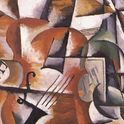There is a picture I have been thinking about for almost a quarter of a century. It is to me the picture of perfect happiness. In some ways, it is the picture around which I have shaped my whole adult life.
Aged maybe four, I saw this picture and wanted to live somewhere with cafés, and streetlights, and rain. I wanted to live somewhere with a doorbell; where I wouldn’t always know who was coming in. I wanted to live in such a way that I could, if necessary, go out for chips late at night.
The picture I mean is, of course, the last double-page spread in Judith Kerr’s The Tiger Who Came To Tea. You know the one, if you know the book: streetlights pooling their reflections on wet streets, and a coat over your nightie. A café with steamed up windows that serves chips and a sense of unexpected freedom.
Not just freedom, though, but the sense too of something extraordinary: the sense that life as you know it might be upended at any minute by a tiger, or indeed any other change of plans. A sense that all the rules—bedtime, for instance, or what we wear outside, or where we go when it’s dark—are mutable, given the right circumstances.
Kerr, who died this week aged 95, made a world where the ordinary and the extraordinary went hand in hand: where the matter-of-fact-ness of the strange (Tiger Food!) and the precise and loving details of the domestic (“all Daddy’s beer”) are equally important. Ordinary life is extraordinary, and worth noticing. And yet extraordinary things happen to ordinary people all the time.
The world, per Kerr, is a staggering place full of exciting things. Sometimes those things are tigers and sometimes they are cafés in the dark, sometimes they are fleeing your home, and sometimes they are fireworks on Bastille Day or learning to speak French or fragments of bombed-out glass shimmering beautifully and sparklingly on the pavement. You never know who will be at the door: the list of possibilities—even before the tiger comes into play—is thrilling. So many people! So many options! And then the option you didn’t even know you had!
It isn’t that there is nothing to be afraid of. There are many things to be afraid of: the tiger eats everything! The tiger will not talk! The tiger is only looking around for something else to eat! The Nazis came for our passports the day after the election! Burglars, house-fires and death! The world is strange and full of strange things—and yet in Kerr’s writing, all are addressed with the firm conviction that in her hands you are, essentially, safe.
Something about the soft pencil quality of Kerr’s drawings (“more rubbing out than drawing”, she always said) made her feel like a friend. They made the people who love her feel like friends, too.
A Small Person Far Away is often talked about as “the last in her children’s trilogy”—the one that begins with the better-known When Hitler Stole Pink Rabbit and continues with Bombs on Aunt Daisy.A Small Person, however, is not for children at all but for grown-ups. It’s about being young and married and wondering who you used to be. It’s about wondering what home is, and what it means, and if you can go back there. And it acts, in that sense, as a kind of prequel to the (definitely for children) Mog books. Because Mog is about home: a new home, and a family based on Kerr’s own. It is a generous thing, to share your home like this, and Kerr was the kind of generous writer that made it seem easy.
There are many things in life that do not go according to plan. Kerr’s books are about what you do next. You buy the tiger food. You put your coat over your nightie. You eat the chips. You make the new home.
You can’t plan for Nazis, but you can move to France, and go to art school. You can’t plan for a burglar, but you can have a cup of tea when he wakes you up—and the burglar can have one too. (Is there a more tender picture in all of literature than the guilty-looking burglar drinking tea with Mr and Mrs Thomas in Mog And The Burglar?) What Kerr brought to all of her books is the sense that whatever you’ve got, you can probably make something of it if you try: whether that’s tea, or Paris, or a tin of tiger food.
In an interview given shortly before her death, Kerr told the Guardian that she would change “nothing, really” about her life. “Because it was interesting,” she said. Even quite terrible things can be interesting, her books teach us, if we notice the people and feelings and events around them. Even really terrible things. Even death—and when death is noticed perhaps it isn’t so terrible after all.
"Because people do die, and you don't lose them,” she told the Guardian in 2002, in an interview about Goodbye Mog. We didn’t lose Mog; and we won’t lose Judith Kerr, not really. She’s there on the page, alive and fair and cheerful; she’s there in Anna and Debbie and the mother and daughter waiting for the tiger.
And she’s there, too, in the tiger, blowing his horn on the very last page: goodbye, goodbye, goodbye, Judith Kerr.
Goodbye to Judith Kerr, who made the ordinary seem extraordinary
There are many things in life that do not go according to plan. Kerr’s books are about what you do next
May 24, 2019

Writer Judith Kerr is received at the Red Town Hall in Berlin, Germany in 2013. Photo: PA












